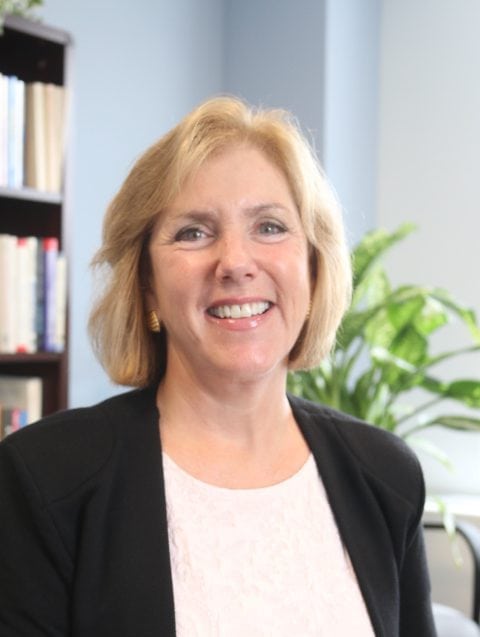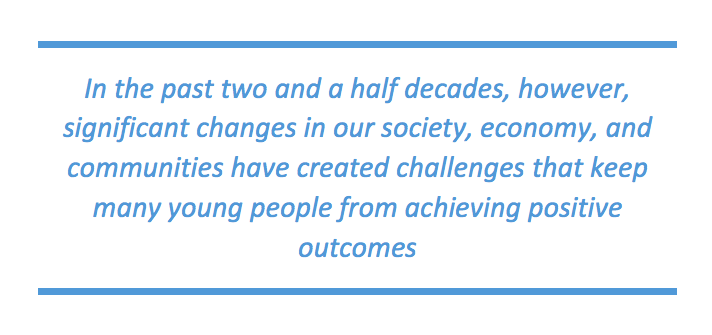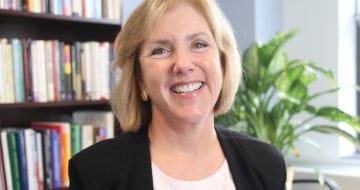
Betsy Brand, AYPF Executive Director
As we start the new year, we are excited that the American Youth Policy Forum (AYPF) will celebrate its 25th anniversary in 2018. Woohoo! I think that’s quite an achievement, and I am grateful to all of our funders, supporters, board members, current and former staff, and participants in our events who made this milestone possible.
In the 25 years that AYPF has been in existence, much has been done to help traditionally underserved youth become more successful, and we count our efforts in improving youth policy as a significant contribution. As an important voice in education, youth, and workforce policy, AYPF has educated, informed, and engaged policymakers at the national, state, and local levels to help them implement policies that support underserved youth.
In the past two and a half decades, however, significant changes in our society, economy, and communities have created challenges that keep many young people from achieving positive outcomes. The pace of these changes has been so rapid and has touched so many aspects of our lives that it can be difficult to make sense of it all. Several changes have particular implications for education, youth, and workforce and affect our work to inform policy.
The United States has been experiencing significant demographic changes, and many schools now enroll a majority of students of color and sometimes students from hundreds of countries speaking dozens of languages. Many schools are unprepared for this influx of youth from other countries and lack educators with experience teaching English as a second language or who lack experience working with students from so many diverse cultures.
Rapid technological change has touched us all – in some good ways and some negative ways. Computer assisted learning can be very helpful for many students, but rapid shifts in technological use have hampered some schools that do not have personnel trained to use it effectively. And some students and their families, particularly those who live in under-resourced and rural communities, still lack access to the internet.
 The internet and social media have taken over our lives, and children today are more connected than ever, spending an average of nine hours on social media a day, according to SocialMediaToday. They are bombarded with information, which makes it easier to conduct research and exploration, but children and youth (and many adults) do not have the skills to sift through the information and assess what is reliable and trustworthy and what is not. Social media and technology can also have negative social and emotional impacts on youth, such as the increase in online bullying.
The internet and social media have taken over our lives, and children today are more connected than ever, spending an average of nine hours on social media a day, according to SocialMediaToday. They are bombarded with information, which makes it easier to conduct research and exploration, but children and youth (and many adults) do not have the skills to sift through the information and assess what is reliable and trustworthy and what is not. Social media and technology can also have negative social and emotional impacts on youth, such as the increase in online bullying.
Globalization and automation are changing the way work is organized and structured, and as a result, the good jobs that used to exist for those without postsecondary education are disappearing, replaced either by low-skill and low-wage employment or employment that demands much higher skill and knowledge levels. As work becomes more complex, the list of skills employers want their employees to have is changing. Communication, problem-solving, creativity, collaboration, flexibility, adaptability, and social and emotional skills all show up prominently in job descriptions these days, but our youth are not necessarily being given the opportunities to learn these skills, according to both employers and to students themselves.
The United States has also experienced a growing disparity in income levels, and this economic stratification has resulted in major academic and achievement gaps that are well documented. Those gaps start at birth, continue in elementary school to high school, carry over into college, and ultimately to the labor market. Youth who lack a high school diploma or credential experience greater unemployment, lower wages, and have been the last group to recover from the Great Recession. We also face divisive racial divides that have roots in structural and institutional inequity that compound the economic disparities. Too many students continue to attend schools that are racially and economically segregated that do not provide the quality education needed to succeed in today’s economy. Our educational institutions are still often separate and unequal.
All of these changes and disparities have created serious divides in our society. We are more polarized in our politics and daily discourse than ever before. Solving problems and coming to compromises are viewed as negatives not positives. Civic engagement has declined along with basic knowledge about how our government works.
We are all impacted by these changes, but youth who have traditionally been underserved, such as youth in the juvenile justice or foster care systems, youth with disabilities, recent immigrants, youth who live in poverty, and those of certain races, have been affected more than others. Often this is because the systems that should be helping them overcome obstacles are not doing a good job. Most of these systems and programs were designed decades ago to serve a very different population with different needs and have not been updated or altered to address today’s realities. Regardless, many public and private institutions and organizations are failing our youth, especially those who are most at-risk.
AYPF has always been committed to helping policymakers formulate and improve policies that help traditionally underserved youth achieve better life outcomes. We believe policies need to be in place to provide full and diverse opportunities for social, educational, and economic equity for all. We realize that policies need to focus on the youth themselves, but policies should also address the institutional barriers to success.
As we start our 25th year, the AYPF team has developed a new strategic plan that strengthens our focus on youth who have been traditionally underserved, and we have tightened up our focus on four policy pillars that we think are essential if youth are to be successful lifelong learners, family wage earners, and engaged citizens. The four policy pillars that will drive our work in the future are: (1) Personalized Learning; (2) Pathways to College and Career Readiness and Success; (3) Comprehensive Connected Supports; and (4) Expanding Learning and Skill Development.
Next week and over the course of the next several months, I’ll discuss each of these policy pillars in greater detail. While I will describe each area separately, AYPF understands that all four policy pillars need to be present and aligned for true success.
We would love to hear from you if these themes resonate with your work and if there are ways we could partner to amplify our messages and efforts.
We’ll also be celebrating our 25th year in various ways this year, so stay tuned and join us.
Here’s to a happy and productive 2018!




